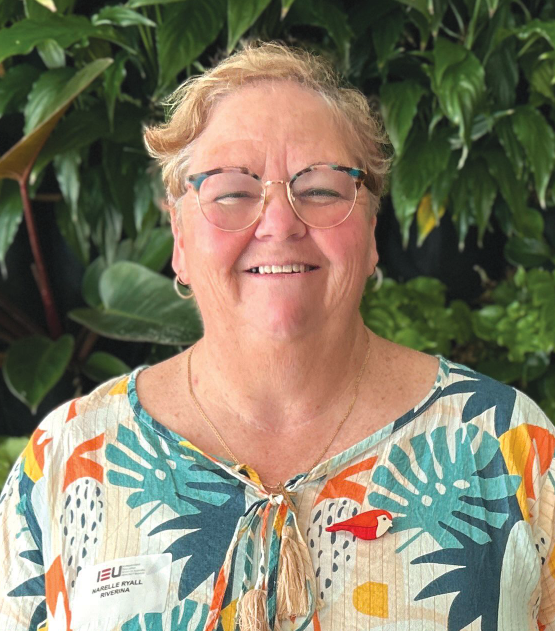Nows the time: Spotlight on Reps
IEU reps in independent schools talk about how they’re building strong chapters.Strong chapters make for a strong union and therefore greater bargaining power for all members.

Michelle Mella
Presbyterian Ladies’ College (PLC), Croydon
As someone from a working class and migrant background, history teacher Michelle Mella felt strongly that she had a civic duty to serve as a union rep.
“I’m keenly aware that Australia’s experience of nationhood is linked to the development of the trade union movement – Australia was one of the first countries to have a minimum wage and a court of conciliation and arbitration, unheard of in other places,” Michelle said.
“I appreciate everything that unions have done in this country to secure living wages for Australians and decent working conditions.
“This is a legacy that we don’t want to squander, and we certainly don’t want to end up with a group of Australians who could be deemed the working poor.”
Michelle said there is growing disappointment among members at her school with the way the Association of Independent Schools (AIS; the employer respresentative) has started negotiations, and a sense that some of the working conditions that teachers in independent schools enjoy might be reduced.
Michelle said she and other members “don’t want to see our working conditions diminished, particularly when you consider work?intensification”.
“We have confidence that the union will respond to what the AIS is presenting, and we hope to get behind the union campaign.”
Members would be keen to see the ‘pay premium’ restored in independent schools for?all the extra co-curricular work they do, she?said.
“Teachers tell me that they’re quite worn out and threadbare, and they want to see a deal that not only entices people into the profession but keeps people working comfortably in this profession.
“Teachers do work in the evenings, on weekends, during school holidays, or what is now referred to as ‘non-term-time attendance’.
“Teachers know that the expectation is excellence, and they want to live up to that,” she?said.
“But we need negotiations that support teachers in a way that is sustainable and doesn’t compromise their work-life balance, because that’s not being achieved, and morale has suffered.”

Bernadette Norton
Oxley College, Bowral
Bernadette Norton is a rep at Oxley College, Bowral, in the Southern Highlands, where she?teaches science.
Having been at the school for seven years, Bernadette put her hand up to become a rep this year when the previous rep left. “I was keen to do it, because I think people have got to have a voice,” Bernadette said. “It’s a serious position. People speak to the rep when they’ve got troubles, and it’s important in people’s lives. So, I thought, ‘right, I’ll do it’.”
Bernadette came to the IEU’s reps’ training in May. “I’ll walk out of here feeling a lot more confident and also knowing who to ask when I have questions,” she said. “Our organiser has already been down to our chapter meetings and we keep in touch. He’s been a great help.”
The Oxley College chapter has grown by 17 members this year alone. “We have quite a few new members this year and others are talking about it, including our professional and admin staff,” Bernadette said.
Again, workloads are a key issue, particularly co-curricular activities. “We have to do 80 hours a year and, for a lot of it, people are not paid at all – it’s two weeks of your time a year.”
From 5pm to 7.30pm one evening a week, Bernadette runs a study club in the library for Years 11 and 12, but she receives no extra payment.
Over the past two years there has been some success for staff who do Saturday sport. “They’re on the bus at five on a Saturday morning and don’t get back till six on a Saturday night. They’re now getting some payment,” Bernadette said.
Bernadette believes in being a rep because when members speak up, “things can change”, she said.
“It’s not about being ‘bolshie’. It’s just about giving people a voice so we can do what we say we do in Australia – have that ‘fair go’. It’s about that,” she said.
“I don’t hide from confrontation, but nor do I seek it. But a lot of people just can’t speak up for themselves. So as a union, with our strength in numbers, and not just within our school, but all schools connected, I think that gives people a chance to do their best work. That’s all we want.”

Holly Wright
Riverina Anglican College,Wagga Wagga
Unionism is in Holly Wright’s blood, so it’s no surprise she became a rep. “I came from a very political family, and I grew up at the knee of my grandfather, who was General Secretary at his draftsmen’s union back in the 60s and 70s,” said Holly, who teaches at Riverina Anglican College.
Holly has been a union rep for her entire 15-year teaching career, with eight of those with the IEU. “The reason I’m a union member and rep is because I believe in standing up for the collective good,” she said.
When an individual stands up against unfair treatment on their own, their strength is limited, Holly says, but when they’re part of a group, it’s easier to make a real impact.
As a history teacher, she teaches her students about the development of the union movement and appreciates its impact on creating a more fair and equitable society. She believes it’s important to remind people that today, “the average union member is a 50-year-old nurse or teacher”.
Holly has several priorities she’s focused on addressing as a rep, including recruiting more non-teaching staff and improving their conditions because “they work hard, they put up with so much”, she said. Compared with teachers, “they get a raw deal”, Holly said, and she is determined to help change that.

Maggie Findlay
St Peter’s Anglican College, Broulee
Maggie Findlay is a maths teacher and head of department at her south coast school. She says being the union rep is part of her DNA.
“My granddad would be proud knowing that I’m out there trying to get fair conditions for everyone and helping people fight for their rights,” Maggie said.
Staff at her school were concerned about “workload creep”, she said. “Every year there’s a little bit extra”.
Maggie would like to see school-based standards to provide clarity on what is required of each school and teacher.
“At the moment, it’s unclear what each school can expect from their teachers and staff members, even in terms of what a full load of teaching looks like, how many extra duties and meetings they have to attend – what is expected of a staff member and what it means to be a teacher at each school.”
Another concern is pay parity across sectors. The historic pay rises recently awarded to government schools is the main negotiating point moving forward, she said.

Sukli Barrell
Galstaun College, Ingleside
Sukli Barrell teaches design and technology at Galstaun College, Ingleside, a bilingual Armenian Christian school for students from kindergarten to Year 12.
An IEU member for 33 years, Sukli has been a rep for about six years now. “I’ve always been a unionist,” she said. Sukli’s also a delegate on IEU Council, the union’s decision-making body.
Sukli looks forward to holding chapter meetings to talk about the benefits of union membership and seeing her chapter grow this year, especially among the professional staff.
“Anything you need at work that you haven’t got, you’re not likely to get it unless you’re in the union,” she said. “And the more numbers you’ve got when you ask, the better chance you have.”
Sukli attended IEU reps’ training earlier this year. “I wanted to learn more about how to be a rep, how to go about it, and if people ask me things, how to go about getting the right information for them,” she said.

Alex Thompson
Canberra Grammar School
Alex Thompson teaches history at Canberra Grammar School, where he has been an IEU rep for some years.
Alex said he is worried about the pay in independent schools falling behind salaries in NSW government schools.
“We are not going to be able to attract and retain staff, which is going to put more pressure on those left to cover classes and manage minimum supervision. It’s going to lead to a reduced educational experience, and no one wants to see that,” Alex said.
“IEU members want everyone, whether they’re a teacher or professional or operational staff, to join the union, because if we stand together, we will be able to let the principals know that we will not accept a reduction in pay, or leave conditions,” he said.
“We want our principal to tell the AIS that we need a deal which will attract and retain experienced staff so they can do their job of leading, teaching and learning and supporting students every day.”
Alex said he enjoys being a rep as it brings staff together and gives them a voice.
“I find it extremely rewarding, and that’s why I keep coming back to do it year after year and have been trying to encourage others to get involved with our committees so that they can experience being a force for positive change.
For Alex, when he hears from a fellow member with an idea to improve their school or when he supports a colleague who is facing challenges, those are the best parts of his day.
“I think the union is an important part of independent schools in providing a line of communication to management that sits outside of the chain of command. And I’m grateful that we’ve got an executive who appreciate and understand that.”
Alex said school-based standards are important to his members. They also want to see a reduction in workloads.
“We think the union’s proposal for school-based standards that consider the situation of an individual school is the right way forward.
“It makes it clear what the work of a teacher entails and ensures there are effective committees for teachers and support staff to make workloads more manageable, more efficient and prevent burnout and staff attrition.
“Overwork is making teaching untenable. We want to bring the joy back to the classroom by working collaboratively with our management through a committee and through sharing information.”

Sharon Draper
Calrossy Anglican School,East Tamworth
Sharon Draper became a union rep to seek recognition for teachers who often don’t speak up for themselves.
“Teachers rarely put their own needs ahead of their students, and that’s often used against us by management to make us give more, do more, or feel guilty about standing up for our own entitlements and rights. So that’s one of the big reasons that I’m a union rep, because I know that unity is strength,” Sharon said.
She feels that independent school staff pay, particularly for support staff, is falling behind compared to other schools.
“We’re concerned about the underlying threat made by management about smaller regional schools not being able to afford any pay rise, and there will be job losses as a result,” she said.
“Increasing workloads is a concern for all and having some workplace standards about what is a full load, what are extracurricular activities, what is the long service leave policy, etc, would be good so we know what our entitlements are.”
Sharon said teachers want to be allowed todo their job and receive fair and timely outcomes from the current negotiations that support their work.
“A big issue is teacher wellbeing. We look after the children’s wellbeing, yet our own is often neglected, and it’s difficult to look after others when you’re not being looked after yourself.”

Narelle Ryall
Aspect Riverina School, Albury
“It is not so much what inspired me to become a rep but who inspired me,” said Narelle Ryall, a teacher’s aide at Aspect Riverina School in Albury, NSW.
“When I first started my job, the only staff?employed were two teachers and myself,” Narelle said.
“We had 12 students to teach. As the numbers of students increased, so did the number of staff, and this is when I met Robyn Davis, another teacher. Robyn has a passion for helping and nurturing both students and staff.
“Over time, the number of students and staff grew, and Robyn was always there with a shoulder to cry on, wonderful advice and a tenacity to find a solution for a tricky situation,” Narelle said.
Robyn introduced Narelle to her IEU organiser, Lyn Caton [now Assistant Secretary], who became another inspiration. “Lyn would ring and check up on me through those tricky times,” Narelle said.?“These two wonderful women, Robyn and Lyn, are still great inspirations.”
Narelle then met “more amazing union women” – IEU members, organisers and officials.
“They all inspired me to become a rep so that others can be represented with integrity, honesty, passion and tenacity,” Narelle said.
Through their encouragement, Narelle became an IEU Council delegate, joining more than 100 other members on the union’s decision-making body. Narelle notes the constancy of union representation throughout many changes at her school, which recently welcomed a new principal.
Members at Aspect Riverina are part of the Now’s the Time campaign for pay rises and school-based standards in independent schools. “Staff would like a pay rise,?safer working conditions, better tools of trade to enable them to do their jobs better, and greater respect through honest and open communication,” she said.

Will Rennes
Aspect Hunter - Port Macquarie
“I was inspired to become a union representative after witnessing what other reps were able to achieve in the workplace when we band together,” said Will, who is a teacher at Aspect Hunter-Port Macquarie.
“I also wanted to learn more about our rights in the workplace to better support and empower teachers and support staff,” he said.
Members at Will’s school are part of the Now’s the Time campaign for a whole new deal in independent schools.
“The members of my school would like to see fairer wages for teachers and support staff, and more transparency and fairness in school-based standards that clearly set out the workload expectations,” he said.

Joe Clark
International Grammar School, Ultimo
Long before Joe Clark was an IEU rep or a teacher, he found himself acting as a “go-between between staff and management” while working in industries without union representation.
He did what he could to negotiate on behalf of his colleagues and support their interests. When he entered teaching, Joe worked at international schools overseas, which were once again lacking in union representation. He came to Australia and became interested in the union movement and the extra support unionism could provide.
So, when a vacancy arose at Joe’s school, International Grammar School (IGS), “I put my hand up and said, ‘let me get involved because I want to fight for fairness within the school’,”he said.
Joe’s seen teacher shortages around the world. He believes the key problem is a shared one – teachers don’t feel supported, no matter where they are.
Members at Joe’s school have several concerns, he said, including “administrative creep and the working conditions for teachers”, the next round of negotiations with the Association of Independent Schools (AIS), pay grades, given the “cost of living crisis and rents in Sydney”, as well as protecting holidays and the right to disconnect.
As a rep, Joe wants to do his best for members at IGS. “It’s about fairness and being given respect, and that you deserve that as a professional,” he said.











































































































































